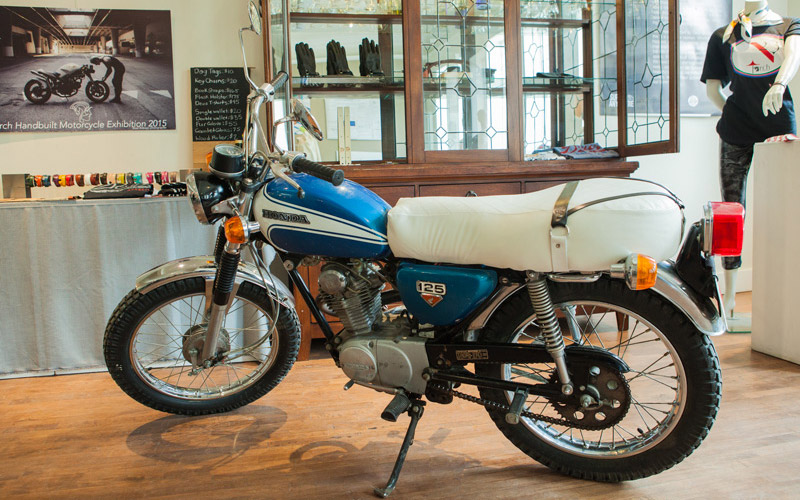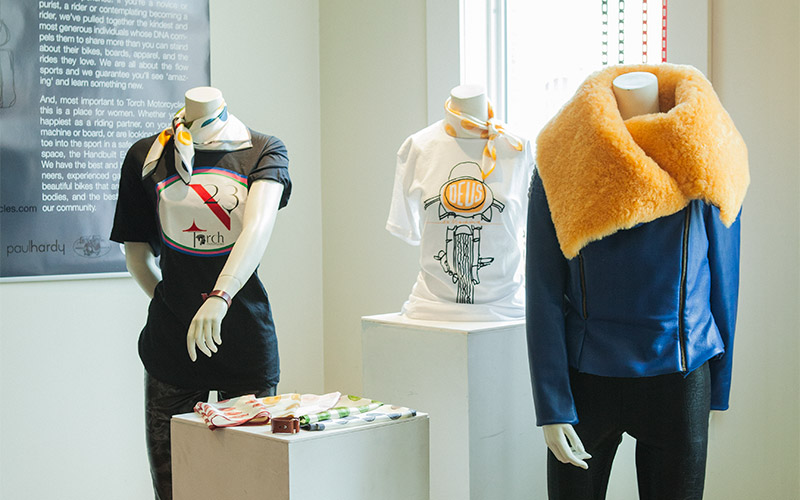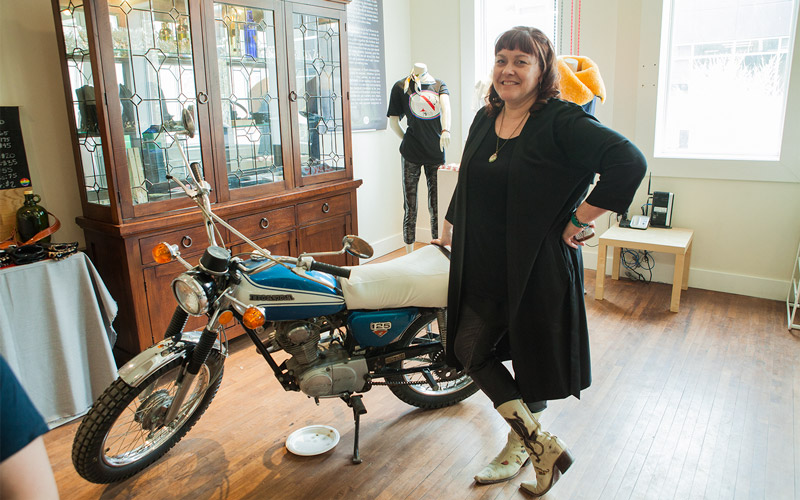Torch Motorcycles
Business professor and “Motress” Patti Derbyshire gets revved up about craft-built bikes and founds a STEM-based startup.
Words by Theresa Tayler
If you build it they will ride it.
Patti Derbyshire believes that women who ride deserve a motorbike that fits.
It's a simple concept. If the bike doesn't fit a person's physiological shape, then the bike isn't safe.
"So why, exactly, are most motorbikes on the market not built for women's bodies?" asked Derbyshire one day last spring as she was making her way along the dusty road from Revelstoke to Calgary on her Kawi 1500.
By the time she and her partner, Bernie, were in Golden they were starting to get revved-up about the idea of a bike built for the 20 per cent of the market.
"What we know from the research is that 30 per cent of new riders are women ... However, only 20 per cent of women make it out of training. The number of women who go on to buy their own bike is just 10 per cent of those new riders," Derbyshire explains. "This is a direct result of women being put on bikes that are not sized for them in training or as they look to purchase, and frankly because they are often marginalized in motorcycle culture."
Derbyshire is the Chair of Entrepreneurship, Marketing and Social Innovation at Mount Royal's Bissett School of Business. When she's not lecturing in the classroom, she's an avid motress - in business and in pleasure. As founder of Torch Motorcycles, Derbyshire has helped assemble a team of entrepreneurs, engineers, mechanical craftspeople and even a fashion designer who are working together provide craft-built, café racer-inspired motorcycles and motorcycle apparel specifically engineered for female riders.
"The motorbikes on the market right now are designed primarily to be managed by upper body strength," explains Derbyshire.
"Women's strength is in their core. When we're riding, our bodies and minds are now trying to manage multiple decisions about how to influence the bike, our presence among other motorists, and safe movement on the road."
Bringing Torch together was no easy task, because there's little research in the area of engineering motorbikes for female bodies, the Torch team had to start at the very beginning.
Engineering for women riders: research, development and design
An early stage Calgary startup, Torch is focused on research and development, collecting anthropometric data to both direct design and to eliminate the hazards and safety issues that women face as consumers and riders of bikes built for men. Torch's core operations and collaborators are drawn from science, technology, engineering and math (STEM)-based areas.
For example, experiments with Torch motorcycle's 1000K seats were led by Becky-Wheat Bain, Torch, human factors engineer.
According to Derbyshire, human factors engineering is a critical asset at Torch.
"Some manufactures claim to have smaller bikes to fit women. Unfortunately it's not that simple. Women anthropometrics are not proportionally smaller than mens. Women's seat bones are wider than male; thigh bones nest at different angles, and a women's pelvic arch is lower than a biologic males, and women also have shorter limbs," she says.
In 2013, starting with a 3D-body scanning geodesic dome technology from Calgary's Maker community, the team learned that the most compelling original data came from a rider's first point of contact with the machine, the seat.
Intentional seat designs dynamically influence safety by increasing comfort, decreasing fatigue, and building confidence, all of which contribute to rider health and safety - and women's longevity in the sport.
In November 2014, Torch began the process of fixing IP on their breakthrough gynopometrics ® measurement systems. And, in a nine-month project with five senior mechanical engineering students (four of whom are women), gynopometrics became foundational to a seat design that reduces the height of a seat by 4 cm, increases rider comfort, and supports a women's pelvis and posture. The most compelling change? Through a series of pressure sensing experiments the team also determined that this seat design reduces rider-seat surface pressure by 20 per cent. Peak pressure on Torch-designed and sculpted seats for women falls below average blood pressure (16kPa) allowing blood to circulate. This means reduced harm to women's reproductive surfaces and no 'numb bum' on long haul rides.
Want to update your ride? Torch takes appointments for their community daily.
For more info check out www.torchmotorcycles.com
Fashion, science and safety mashup
Torch isn't just about creating new advances in motorcycle technology, they're also keen to advance fashion trends that integrate safety imperatives for all riders. A second project led by Kat Marks, a Calgary-born internationally celebrated designer, and co-owner at Torch, is creating a line of apparel and accessories that align with the Torch vision for building wearable couture for the motress set.
One of the greatest risks to riders as it pertains to motor vehicles is a lack of 'salience' or those accidents that occur when car drivers simply do not see riders.
In response, Torch's 100K Jacket uses a Bluetooth technology to expand the visual field of a motorcycle brake light (typically the size of a post card) to over two feet.
In harmony, a bike's braking system talks to the jacket, which initiates arrays of lights in seams and should caps of the 1000K jacket to signal to car drivers their presence and their intentions to stop or turn. Other wearable technologies integrated into the jacket include, the ability to trigger calls to 9-1-1, with healthcare information, in the event of a sudden, unexpected deceleration.
Read more about Derbyshire's connection to advancing women in post-secondary areas of entrepreneurship and tech-start ups in Summit 2015.





